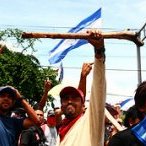
21 de julio de 2009 | Noticias | Honduras libre | Derechos humanos
Unmasking the coup
Honduras coup perpetrators confirm that de facto regime is an attack to ALBA
Descargar: MP3 (1.9 MB)
Since the coup was staged in Honduras on June 28th, both the ousted President, Manuel Zelaya, and the Presidents of Ecuador, Bolivia and Venezuela have warned that what is happening in Honduras actually goes beyond borders, since it could be an attempt against Latin America’s most progressive governments.
On Monday, EFE news agency published declarations of the Deputy Foreign Minister of the Honduran de facto government, Marta Alvarado, who said the political crisis in Honduras reflected the struggle against the Bolivarian Alternative for the Americas (ALBA) in the region.
“Honduras plays an important role, as it depends on Honduras if the avalanche of ALBA member countries continues, and it also depends on Honduras that the peoples which are submitted to these pressures of the ALBA countries, wake up”, Alvarado said.
Meanwhile, President Zelaya announced his return to Honduras, which is scheduled to take place this week, and demanded the international community once again – especially the US – to harshen its measures condemning the coup.
Honduran newspaper La Tribuna published an article on Tuesday describing that the US ambassador to Honduras, Hugo Llorens, had made the mediation proposal to the coup perpetrators, that he submitted to Costa Rican President Oscar Arias a day before the news was made public in San Jose.
“Ambassador Llorens talked in favor of the proposal. He said it was the best thing to recover the international trust of Honduras, in view that the international public opinion was against it. He ratified that there was a coup d’état, and that if this fact was not accepted, Honduras would be subjected economically, and its politicians would be punished in the way they fear the most: the partial or definite suspension of the US visa. Most of the people present were shocked by this”, La Tribuna reports in the editorial written by columnist Juan Ramón Martínez.
Anyway, the mediation proposal failed because even though it was accepted by the whole Zelaya delegation, it was rejected by the representatives of the de facto regime, since they refuse for the President to be reinstated.
President Zelaya later decided to end the talks with the de facto government and announced he would lead the peaceful demonstrations in Honduras.
Although the international community insists that the talks should continue, the authorities of the international organizations have already said that it is very hard to call for peace when a coup government is uncompromising and refuses to leave power.
“It is almost impossible to avoid violence or call for peace when the dictatorship wants to stay in power in plain sight”, Secretary General of the Organization of American States (OAS), José Miguel Insulza, told Chilean radio station Radio Cooperativa.
Imagen: http://www.flickr.com/photos/yamilgonzales








